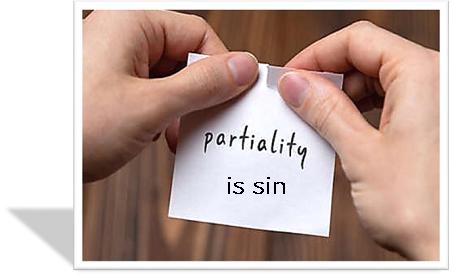God Shows No Partiality In Jesus Christ the Covenant Extends to All Peoples
God Shows No Partiality In Jesus Christ the Covenant Extends to All Peoples

Introduction⤒🔗
The early Christian church learned with difficulty that God extends His covenant promises and obligations to all who believe in Him. God's chosen Israel does not include the descendants of Abraham, Isaac, and Jacob alone; in Jesus Christ "the Gentiles are fellow heirs, members of the same body, and partakers of the promise" (Ephesians 3:6). Especially the Judaizers found this doctrine hard to accept, and when they observed Peter baptizing non-Jews they were amazed, because the gift of the Holy Spirit had been poured "even on the Gentiles" (Acts 10:45). As one commentator remarks, "the cleavage between Jew and Gentile was for Judaism the most radical within the human race."1 It was no easy task therefore, for the disciples and apostles to convince the early church that Jesus Christ had broken down the "dividing wall of hostility" (Ephesians 2:14) which separated Jews from Gentiles, and that He had made them one.
The Jewish members of the young church could have known that God's covenant promise is for all peoples, for it was already in the old dispensation that the Lord had promised His grace to the entire world. The prophet Joel, for example, predicts: "it shall come to pass that all who call upon the name of the Lord shall be delivered" (Joel 2:32). And Matthew reminds his readers of another Old Testament prophecy, when he quotes Isaiah, who speaks thus of the coming Messiah: "He shall proclaim justice to the Gentiles … and in His name will the Gentiles hope" (Matthew 12:18, 21).
With the incarnation of Jesus Christ the gospel of salvation to all mankind becomes more pronounced. Even as infant Jesus is called by Simeon "a light for revelation to the Gentiles" (Luke 2:32). When He heals the paralyzed servant of the centurion of Capernaum, Jesus Christ notes that this foreigner's faith is stronger than that of any in Israel, and He reminds His audience that "many will come from east and west and sit at the table with Abraham, Isaac, and Jacob in the kingdom of heaven" (Matthew 8:11). The Lord also proclaims that He has "other sheep, that are not of this fold" (John 10:16, 19). Before His ascension Jesus charges also His disciples to bear testimony to the Gentiles (Matthew 10:18), and to "make disciples of all nations" (Matthew 28:19).2 The proclamation of the gospel of grace to all peoples without discrimination is a command of Jesus Christ.
The disciples and apostles take the command to heart, as the New Testament shows repeatedly. One expression employed to stress that God's gift of grace is for all who believe in Him is "God shows no partiality." Since these words convey one of the prime doctrines of Christianity, it is important to understand their full significance for the church then and now. In this article I shall elucidate the meaning of this biblical expression by considering its Hebrew origin and its use in the New Testament.
The Meaning and Origin of the Expression←⤒🔗
The Greek word rendered by the English "to show partiality" has a fascinating history. "Prosõpolẽmpsia" (and related Greek words) does not occur in Classical Greek, and appears for the first time in the New Testament.3 This compound word is formed from the Greek word for "face" (prosõpon) and a noun form of the verb "to receive" (Iambanõ). The novel combination suggests that "prosõpolẽmpsia" is not a word of Greek origin, but a probable loan-word from Hebrew.

The phrase "to receive the face" does occur in the Septuagint – the Greek translation of the Old Testament – and it is plausible that the N.T. word is formed from it. In Psalm 82:2, for example, the RSV reads, "How long will you judge unjustly and show partiality to the wicked?" The Septuagint translates the Hebrew words literally: "to receive the face of the wicked." Leviticus 19:15 is another passage in which the Septuagint uses the phrase "to receive the face": "You shall do no injustice in judgment; you shall not be partial to the poor" (literally, 'receive the face of the poor') or defer to the great, but in righteousness shall you judge your neighbour." The literal rendering in these two texts makes as little sense in Greek as it does in English, and begs explanation.
The Meaning and Use of the Hebrew "Nasah Panim"←⤒🔗
In these instances the Greek translates some form of the Hebrew words "nasah panim." This phrase concerns the sphere of social behaviour, and conveys a custom of polite greeting in the ancient near East. As E. Lohse points out, when one Hebrew greets another, he might bow low towards the ground before him.4 If the person thus greeted raises or lifts the face of the one bowing before him, he shows his recognition and respect. Thus the expression "nasah panim" literally means "to receive the face," but figuratively connotes "to show respect, to esteem."
Although "nasah panim" may have originated in social custom, the expression (and its synonyms) appears repeatedly in legal contexts. Leviticus 19:15, quoted above, is an injunction to the Israelites to be unprejudiced in courts of law. Another instance is Proverbs 18:5: "It is not good to be partial to a wicked man." The people of Israel are instructed to show no undue esteem to anyone in legal trials.
God enjoins His covenant people to be impartial in courts of law, for He Himself is impartial, as numerous Old Testament texts state. Elihu reminds Job and his fellow debaters that the Lord "shows no partiality to princes, nor regards the rich more than the poor" (Job 34:19). Similarly, in 2 Chronicles 19:7 we read, "for there is no perversion of justice with the Lord our God, or partiality, or taking bribes."5 God's equity in judgment is most clearly expressed by "nasah panim" in Psalm 82, where the poet depicts God's divine tribunal, at which the gods are arraigned: "in the midst of the gods He holds judgment: 'How long will you judge unjustly and show partiality to the wicked?'" (1-2). The psalmist contrasts the fairness of God's justice with the prejudiced judgment of the "gods," and concludes: "Arise, O God, judge the earth; for to Thee belong all the nations" (v. 8). Thus Psalm 82 praises the impartial judgment of Israel's covenant God.
From this selection of Hebrew texts we deduce that the phrase "nasah panim," from which the Greek "Prosõpolẽmpsia" derives, is used figuratively in the Old Testament to mean "show undue respect," "be partial towards." It occurs especially in legal contexts, and is applied to the people of Israel and to their God. As we turn to the New Testament passages in which "Prosõpolẽmpsia" occurs, we do well to keep in mind this Semitic origin and usage.
Peter and the Roman Centurion (Acts 10)←⤒🔗
One of Luke's aims in the book of Acts is to record the manner in which the apostles fulfil the mandate of Christ to be His "witnesses in Jerusalem and in all Judea and Samaria and to the end of earth" (Acts 1:8). One instance of the spreading of the gospel beyond the people of Israel is recorded in Acts 10, where Peter meets the God-fearing Roman centurion in Caesarea. Having understood the implications of the vision of the sheet of clean and unclean animals (10:10-16), Peter says to the centurion that "God has shown me that I should not call any man common or unclean" (10:28) and says further, "truly I perceive that God shows no partiality, but in every nation everyone who fears Him and does what is right is acceptable to Him" (10:34-35). The apostle says literally that God is "not a receiver of faces." Peter uses the word" Prosõpolẽmptẽs" to describe God's equal treatment of all mankind. Being an unprejudiced judge of human deeds, God does no longer prefer the Jews to the Gentiles. Accordingly, His covenant of grace now extends to all mankind.6
The Roman centurion, therefore, should take heart, knowing that "every one who believes in Him receives forgiveness of sins through His Name" (Acts 10:43). The proclamation of the gospel is indiscriminate, as the vision of the sheet of clean and unclean animals had taught Peter.7

Peter's equal treatment of Jews and Gentiles causes a reaction from the Jews who think that the gospel is reserved for them. The believers from "among the circumcised," as Luke puts it, are surprised to see that the Gentiles receive the gift of the Holy Spirit and speak in tongues and praise God (Acts 10:45). The circumcision party criticizes Peter for preaching to, and even baptizing, the Gentiles. When Peter and Paul continue proclaiming that the gospel of salvation is irrespective of race, the Judaizers mount an organized opposition, claiming that it is necessary for the Gentile believers to keep the law of Moses and be circumcised. At the "conference in Jerusalem" (Acts 15) Peter restates his conviction that God "made no distinction between us (Jews) and them (Gentiles)" (15:9). Paul and Barnabas reinforce Peter's speech by relating what signs God did through them among the Gentiles, while James reminds especially the Jewish audience that already in the first dispensation the prophets spoke of the expansion of God's covenant beyond Israel. James quotes Amos 9:11-12, of which these words are central: "that the rest of men may seek the Lord and all the Gentiles who are called by my name" (Acts 15:17). The conference in Jerusalem thus confirms the impartiality of God's covenant promises to all who believe in Him.
Jew and Greek (Romans 2:11)←⤒🔗
In his letter to the Romans Paul expresses his "obligation both to Greeks and to barbarians, both to the wise and to the foolish … to the Jew first and also to the Greek" (Romans 1:14, 16). This preface broaches a recurring theme in the letter that the gospel of salvation in Jesus Christ is for all peoples. Accordingly, the apostle uses the phrase "God shows no partiality" in his argument that in the new dispensation God's covenant people are not those who uphold the laws of Moses, but those who have faith in Jesus Christ.
In the second chapter of the letter Paul warns against hypocritical judgments of men. How can one presume, Paul asks in verse two, that the judgment of God will favour one over another? God will render everyone according to his works, and when the great day of judgment arrives, "there will be tribulation and distress for every human being who does evil, the Jew first and also the Greek, but glory and honour and peace for everyone who does good, the Jew first and also the Greek. For God shows no partiality" (2:9-11).
Knowing that the Hebrew phrase "nasah panim" from which the Greek "Prosõpolẽmpsia" is formed occurs especially in juridical contexts, we are not surprised to read that Paul employs the word here in a similar legal setting. God's judgment of the whole world will show no discrimination. Paul points out that the Jewish people will not receive special treatment when the judgment day arrives. Though the Israelites were privileged to receive the laws and oracles of Moses (Romans 3:2), they will not be preferred to other people's when the actions of all will be considered. For, argues Paul, "there is no distinction; since all have sinned and fall short of the glory of God" (Romans 3:22-23). All mankind, Jews and Greeks included, are equal in the sight of God, as all are condemned because of sin. Appeals to the laws of Moses will be fruitless when God evaluates the deeds of men. The corollary to Paul's identification of Jews and Gentiles in the guilt which they have in common before the judgment of God is expressed in chapters 10 and 11. There the apostle shows that the blessings of the covenant are for both Jews and Greeks. Paul argues that the words of Joel 2:32 ("Everyone who calls upon the name of the Lord will be saved") apply to Jews and Greeks alike, for "there is no distinction between Jew and Greek; the same Lord is Lord of all and bestows His riches upon all who call upon Him" (10:11-13). Thus the blessings and riches of God's covenant are extended equally to Jewish and Gentile people. In His justice and in His mercy God is no respecter of persons.
The Warnings of James and Peter←⤒🔗
We noted above that in the Old Testament the covenant people are commanded to be impartial since their God is impartial. In the New Testament this command remains, as James proves. He writes to the congregation: "show no partiality as you hold the faith of our Lord Jesus Christ" (2:1). He gives an example of a rich man who receives special attention as he enters the assembly, while a poor man is cursorily treated (2:1-7).8 James asks his readers, "Have you not made distinctions among yourselves, and become judges with evil thoughts?" (2:4) He implies that unfair behaviour among the members of Christ's body conflicts with their faith in Jesus Christ, whose death and resurrection was for all alike. James warns his readers: "if you show partiality, you commit sin, and are convicted by the law as transgressors" (2:9). Rather, he argues, since God's mercy triumphs over judgment (2:13), the members of the congregation ought to "so speak and act as those who are judged under the law of liberty" (2:12). The mercy of God was poured out on the whole human race in the death of Jesus Christ. The members of the church must treat one another as equals, since they equally received the mercy of God.

Peter's advice to the exiled church is like James'. He encourages his readers to be holy in conduct, as their God is holy. And Peter reminds them, "if you invoke as Father Him who judges each one impartially according to his deeds, conduct yourselves with fear" (1 Peter 1:17).9 The context in which the adverb "aprosõpolẽmptos" occurs is, not unexpectedly, God's judgment of the deeds of man. Like James, Peter warns that the covenant Father does not favour one member of the congregation more than another. The divine justice which will be meted out one day is an example for the Christians. As God is unprejudiced, so too His people ought to be unprejudiced in their conduct, and to act in wisdom and fear.
Conclusion: The Canons of Dort←⤒🔗
It is instructive to conclude with reference to two articles in the Canons of Dort which concern the spreading of the gospel and God's undeserved grace. In dealing with the history of revelation the Canons state that under the new dispensation, God "took the distinction away" and revealed the "mystery of His will" not to the Jews alone but to a larger number of people. "The cause of this very distribution of the gospel is not to be ascribed to the worthiness of one people above another, nor to the better use of the light of nature, but to the sovereign good pleasure and undeserved love of God" (NI/lV,7). Regarding the Christian attitude to God's unmerited grace the Canons remind us that towards those who have not yet been called, "we must by no means act haughtily, as if we had distinguished ourselves from them" (

Add new comment